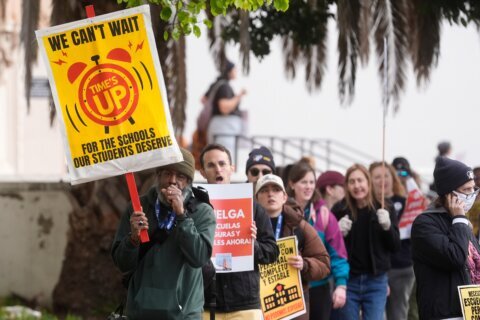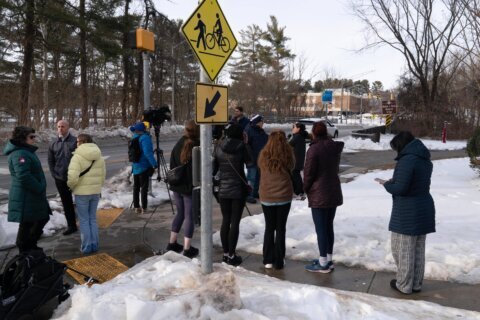From vaping, the cost of school supplies to cellphone policies, the WTOP team is studying up on hot-button topics in education across the D.C. region. Follow on air and online in our series “WTOP Goes Back to School” this August and September.
Cellphone use in schools has become one of the most controversial topics in the D.C. area as the new academic year kicks off.
Virginia Gov. Glenn Youngkin’s July executive order establishing the need for cellphone-free education across the state — and the Virginia Department of Education’s draft guidelines calling for “bell-to-bell” cellphone-free schools — are moves that have thrust the impact of cellphone use on education into the forefront.
In an area made up of so many large school districts, it can be difficult for students and families alike to pin down the details of their school’s cellphone policy.
WTOP has put together a list of key cellphone policy details for each of the D.C. area’s major school districts. Read on to review the rules for your child’s school.
DC
The D.C. public school system does not have an across-the-board policy when it comes to student cellphone use. Each individual school can make its own rules regarding when kids can access their devices.
For example, D.C.’s Dunbar High School has a “zero-tolerance (policy) for the use of cellphones during the instructional day.” Meanwhile, students in D.C.’s School Without Walls get a “class-wide reminder” after the first in-class violation of its phone policy.
Maryland
Montgomery County
Students at Montgomery County Public Schools can have “personal mobile devices” — including cellphones, tablets, laptops, headphones, smartwatches and e-readers — at school and school-sponsored activities, but may not turn them on for independent use until the end of the school day.
Devices can be used on the school bus, as long as they don’t interfere with the “safe operation” of the vehicle.
Across all schools in the district, students with an Individualized Education Plan (IEP) or a 504 Plan for disabilities may use a device as part of an accommodation for their special need. On a case-by-case basis, principals can coordinate with school staff to allow students without IEPs to use devices as accommodations.
The district suggests that each of the county’s middle and high schools develop a universal approach to the use of devices in class. Teachers can allow the use of devices as part of in-class instructional activity, if their school leadership allows it.
Middle and high school students may use their devices during lunch.
High school students may use their devices between classes, but it’s still up to the principal’s discretion. Middle school students may not use their devices at passing time.
Prince George’s County
According to the Prince George’s County Board of Education’s policy, students may only use their cellphones before school hours, after school hours, during after-school activities (if given permission by a supervising adult like a coach or administrator), during evening or weekend school-hosted activities and during emergencies, with permission from a supervising adult.
Students are also prohibited from sharing images taken with cellphones during school hours online.
In addition, cellphones must be stored out of sight in students’ backpacks, purses or lockers. They should be completely powered off — not just on “silent” or “vibrate” mode, the policy specifies.
If a student violates the cellphone policy more than once, their penalties will increase in severity as follows:
- First offense: The student’s cellphone will be confiscated and returned to the student at the end of the school day, with the school bearing responsibility if the device is lost or damaged during the confiscation period.
- Second offense: The student’s cellphone will be confiscated and returned only to
the student’s parent or guardian. The school will be responsible if the phone is lost or damaged during the confiscation period. - Third offense: The student will be prohibited from bringing a cellphone to
school for the rest of the academic year. - Any further offenses: Students who repeatedly violate the policy will face “additional disciplinary action consistent with the Student Code of Conduct,” according to the policy.
Virginia
Arlington County
Currently, Arlington County Public Schools require all elementary and middle school students to keep their phones “off and away” during the entire school day, while high schoolers can use their devices only outside of instructional periods — for example, at lunchtime or between classes.
WTOP’s Scott Gelman reported last month that some local parents would like to see the “off and away” policy applied to all of the district’s students, including high schoolers.
“There’s a pretty unified voice that everyone is using because we recognize that simply telling kids to turn their devices off and put them away doesn’t work,” Sheila Kelly, a parent and member of the group Arlington Parents for Education, told WTOP. “I think we all know as adults when we have access to our phones, being told that doesn’t always work.”
Fairfax County
Virginia’s most populated county is ramping up cellphone restrictions for both middle and high schoolers this upcoming academic year.
WTOP’s Scott Gelman reported last month that seven middle schools and nine high schools in the county will participate in cellphone storage pilot programs.
While in class, high schoolers must leave their phones in either a hanging pouch or storage locker. However, devices may still be used at lunch and passing times.
Starting the week of Sept. 2, students at certain middle schools will be provided with a Yondr pouch — a magnetic pouch that can only be unlocked at an unlocking station at the end of the school day. Students must secure their devices in the pouches at the beginning of the day and store the pouches in their backpacks.
Loudoun County
Public schools in Loudoun County are introducing more stringent rules regarding cellphone use this fall.
The new Policy 8655 introduced updated guidelines for elementary, middle and high school students, WTOP’s Neal Augenstein reported last month.
The district’s elementary schoolers may not use their devices at all during the school day, unless their parent or guardian requests otherwise and is granted an exception as part of an Individualized Education Plan (IEP) accommodation.
For middle schoolers, phones must be kept in their lockers on “silent” mode during the day, only to be used before and after school.
A last-minute policy amendment from at-large board member Anne Donohue tightened up the policy’s impact on high school students. Initially, students would have had the option to keep their phones in their pockets or backpacks as long as they were on “silent” mode.
Donohue’s amendment removed that option, requiring high schoolers to keep their devices “in a classroom storage location” that’s not immediately accessible.
She told WTOP: “If the devices are allowed to be within the students’ pocket or backpack, our students have a hard time restraining themselves from checking it, if it’s within reach.”
Prince William County
By next year, Prince William County plans to expand a cellphone usage restriction pilot program across the district’s middle and high schools.
The “off and away” policy, which was already in practice at some county schools, requires middle school students to keep their phones turned off and put away for the entire school day. High schoolers must have their phones away during instructional time.
In July, Prince William School Board Chair Babur Lateef told WTOP’s news partner InsideNoVa that the district plans to extend those policies to each of its schools.
Students could use their phones in the event of an emergency, Lateef said. He added that exceptions will be made for kids with medical issues or IEPs.
“We have had no pushback from parents at all, and the schools that have done it this past year … the students have been pretty cooperative and it’s worked pretty good,” Lateef told InsideNoVa in July. “We continue to receive reports that students seem to be more focused, there’s less distractions in the classrooms. The hallways are actually louder because people are talking to one another.”
Get breaking news and daily headlines delivered to your email inbox by signing up here.
© 2024 WTOP. All Rights Reserved. This website is not intended for users located within the European Economic Area.








